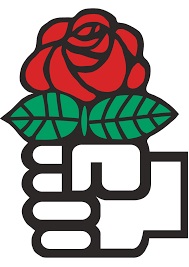 As it stands the Labor Party in Australia has the following objective in its constitution:
As it stands the Labor Party in Australia has the following objective in its constitution:
- The Australian Labor Party is a democratic socialist party and has the objective of the democratic socialisation of industry, production, distribution and exchange, to the extent necessary to eliminate exploitation and other anti-social features in these fields.
Carol Johnson back in July 2015 tells us the 2015 Labor national conference decided to review this ‘socialist objective’ because as Luke Foley claimed:
- … no-one in the party today argues that state ownership is Labor’s central, defining purpose.
(The image above is the symbol for the Socialist International.)
In fact no-one has tried to nationalise anything since Chifley failed to nationalise the banks in 1947. Since then there has been a rash of privatisations, especially under Hawk and Keating, including the Commonwealth Bank, TAA and QANTAS, what is now Telstra and the Commonwealth Serum Laboratries (CSL). Moreover Hawk and Keating floated the dollar and embraced market capitalism and globalisation with enthusiasm, as Johnson says:
- placing an increased emphasis on the positive role of markets and private enterprise in achieving the party’s aims of economic growth, full employment and equality of opportunity.
Whitlam started the process of tariff liberalisation.
- This “socialist objective” was introduced in 1921, but has since been qualified by two further objectives: “maintenance of and support for a competitive non-monopolistic private sector” and “the right to own private property”.
John Quiggin doesn’t call them “further objectives”, he calls them “commitments” and highlights:
- (i) the restoration and maintenance of full employment;
(j) the abolition of poverty, and the achievement of greater equality in the distribution of income, wealth and opportunity; and
(k) social justice and equality for individuals, the family and all social units, and the elimination of exploitation in the home.
The numbering is a clue, and in fact in the Australian Labor Party Constitution the numbering goes down to (v).
There are two objectives. The first is the ‘socialist objective’ as stated up top as Clause 4 of the Constitution. Clause 5 has this stem:
- To achieve the political and social values of equality, democracy, liberty and social co-operation inherent in this objective, the Australian Labor Party stands for:
It then lists 22 sub-clauses, beginning with:
- (a) redistribution of political and economic power so that all members of society have the opportunity to participate in the shaping and control of the institutions and relationships which determine their lives;
(b) establishment and development of public enterprises, based upon federal, state and other forms of social ownership, in appropriate sectors of the economy;
(c) democratic control and strategic social ownership of Australian natural resources for the benefit of all Australians;
(d) maintenance of and support for a competitive non-monopolistic private sector, including small business and farming, controlled and owned by Australians, operating within clear social guidelines and objectives;
Both John Quiggin and Carol Johnson suggest that there is something fundamental about the socialist objective. If the ALP fully embraces capitalism, why have a party at all? Many on the left of the party think the ALP has already gone too far.
Clause 5 is really the liberté, égalité, fraternité of the French Revolution, with democracy thrown in, which is inherent and implied in any case.

I love it, would add justice, and agree with Frances Fukuyama that, like it or not, a competent modern nation-state must be part of the package.
Like John Quiggin, I’d prefer the ‘social democrat’ branding rather than ‘democratic socialist’ because of the baggage associated with ‘socialism’. Quiggin comments:
- I prefer “social democratic” because it clearly refers to the set of policies implemented and advocated by social democrats in the second half of the 20th century, including a mixed economy, an active welfare state, government responsibility for full employment and so on.
By contrast, socialism is less well-defined. It can mean comprehensive public ownership, which I don’t support, or it can be just a general statement of values and aspirations, consistent with social democracy.
I don’t think social democrats in the second half of the 20th century went far enough, and I’m not sure that simply substituting ‘social democratic’ everywhere actually works in terms of language. It’s awkward. If pushed, I’d say be brave and keep ‘democratic socialist’.
I think everyone would like some tweaking of the text, but it’s not so bad and may they take forever working on it! Any criticism can then be answered by “we’re working on it”.
But very seriously, if we are not working on civilising capitalism in our bailiwick and the world, then we might as well just concentrate on having fun while we are here.
Finally, David Havyatt’s article is also useful.

I prefer Social Democratic too – but only as a temporary measure until a more appropriate term comes into everyday conversation. .
There is just too much nasty baggage attached to the word “socialist”.
I think we are playing with words here.
‘Socialism ” comes with too much garbage (think the excesses of Russia) to provide a shorthand way for talking about how we want the economy to work or to provide a framework e what should and shouldn’t be government owned. Few comments:
I don’t think it is healthy to have important decisions made on the basis of “maximizing shareholder wealth.” Particularly given that so many shares are held by super funds and their ilk who have to take a very short term view on results.
We need mechanisms that give stakeholders other than the financier more influence.
We need to get better at sorting out when private really is best and when something else makes more sense.
We need to get more control over what multi-nationals do in individual countries.